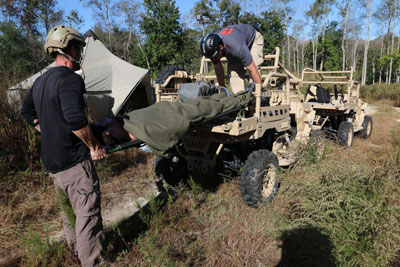U. S. Special Forces Partners With Grady to Train Combat Medics
March 5, 2018
Grady Memorial Hospital is the only civilian hospital in the country that has formed a partnership with the U.S. Army Special Forces to provide additional, formal instruction and preparation for its Green Beret Special Operations Combat Medics (SOCM 18 Delta).
As one of the busiest trauma centers in the country, and metro Atlanta’s only nationally verified level I trauma center, Trauma Chief Dr. Mark Shapiro said Grady is the ideal environment for Special Forces medics to broaden and sharpen their skills.
“Grady knows service—every year the Marcus Trauma Center sees up to 7000 activations, and our Emergency Department has more than 145,000 visits. We treat everything from the routine to the extreme. It’s a unique and challenging experience for the SOCM community,” Shapiro said.
Officially called Mountain Path, medics are deployed on several rotations in the hospital, including burn, emergency medicine, orthopedics, surgical critical care, and trauma.
Grady takes up to two 18 Delta’s or combat support medics at a time, who stay for a two to four-week period, covering shifts ranging from 12 to 30 hours.
“During my four weeks at Grady, there was never a moment where I was just standing around. There was so much to see, do and learn,” said a Green Beret who completed his training at Grady in November 2017 and asked not to be identified.
Green Berets often endure prolonged missions, and have additional training in veterinary care, anesthesia, and surgery. When in austere environments, their amenities and equipment are very limited, and Grady teaches how to stabilize casualties until they can be brought to definitive surgical care, a spokesperson for SOCM said.
“My training here was an incredible refresher. The pace and expertise of everyone — especially the nurses — was impressive,” the Green Beret said.
Through this partnership with Grady, Shapiro’s leadership provides training in prolonged field care. This is an intensive medical course designed to challenge small teams of medics by deploying them in remote locations without nearby surgical support or rapid access to air medical evacuation.
Shapiro recently instructed a 72-hour course with 15 medics, who performed multiple invasive procedures under challenging conditions in coastal, mountain and rural environments.
“Medics’ skills can atrophy when they go months without being in a medical environment. With direct supervision, education and feedback, as well as the hands-on practice, their skills set is kept active,” said Shapiro.

